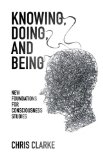new book – ‘Knowing, Being, and Doing: New Foundations for Consciousness Studies’ by Chris Clarke
October 5, 2013
Knowing, Being, and Doing: New Foundations for Consciousness Studies by Chris Clarke (Imprint Academic, 2013)
Book description from the publisher:
Between 1965 and 2002 several key lines of research emerged which, taken together, can potentially revolutionise our understanding of the place of consciousness in the universe. Two of these are crucial: first, the analyses of human mental processes by Barnard, and independently by McGilchrist, revealing two separate elements, one rational and one based on relationships; and, second, research by several workers linking quantum theory to consciousness in much greater detail then hitherto. Both of these investigations use an alternative logical system in order to make sense of the quantum/consciousness area. In this book the author explains the close connections between these new ingredients – connections which until now have barely been noticed. Using these insights the author set out a new foundation for consciousness studies in which consciousness is integrated with physics while retaining its qualitatively different character. Finally the book discusses how this affects our everyday approach to ecology, religion, and spiritual practice.






